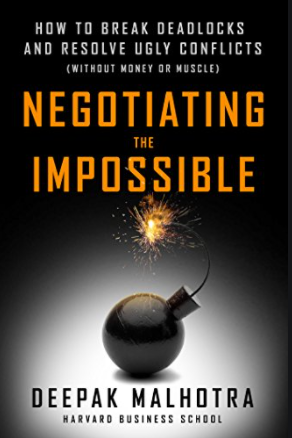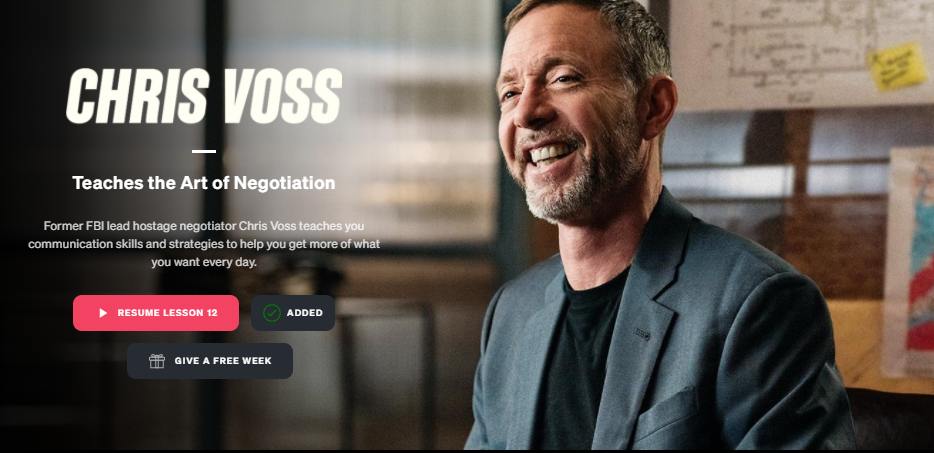How to Learn Negotiation - Getting from Beginner to Pro Negotiator
Looking to sharpen your negotiation skills? Here's a complete guide on how to learn negotiation and ways to practice your new skills in everyday life.

What comes to mind when you hear the word negotiation?
A challenging yet exciting experience that creates new opportunities?
Or a dreadful, terrifying experience that could jeopardize your relationships and make people think you've gone mad?
First, rest assured that it's never quite as bad as the second scenario. In fact, when you master the art of negotiation, things often turn out better than you ever could have imagined.
In this guide, we'll discuss how to learn negotiation and the best tools that will help you hone your skills, even if you're an absolute beginner.
Why It’s Important to Learn How to Negotiate
Effective negotiation skills can save you thousands of dollars each year, at the very least. I first started to appreciate this lesson a couple of years ago when I visited the repair shop to fix an issue with my car.
As you can likely guess, I didn't settle at the initial quote.
I was still a little apprehensive back then, but after a couple rounds of negotiation, we arrived at my target price and the shop owner - who was no doubt surprised at my steadfastness - even jokingly suggested that I come work for them.
After that experience, I gained the realization that very few things in life are completely set in stone.
When you know how to negotiate, you can discover hidden opportunities that may not be explicitly advertised but are absolutely there for the taking.
Life is full of negotiations, and they're not all major, iconic moments. Any time, you're in a situation where you want someone to say yes, you're in a negotiation. Such situations can range anywhere from asking your boss for a raise to persuading your toddler to eat their veggies.
Do you see what this means? By learning how to negotiate, you can generate better results in practically every area of life.
4 Key Areas of Negotiation to Master
Here are four key areas that you should master when you learn negotiation:
1. Active Listening
Negotiation isn't all about talking, it's about listening too. In fact, when you're negotiating, you can only make progress once you fully understand what your counterpart is thinking and feeling.
Active listening involves carefully listening to your counterpart's arguments and responding in a way that shows that you're on the same page.
By learning active listening techniques, you'll discover how to engage in a negotiation without getting distracted by your own thoughts and what you think you should say next.
Related: Best Books about Active Listening
2. Building Rapport
Building rapport is another key area of negotiation. You'll need to learn how to develop strong relationships and trust with the people you interact with.
Rather than viewing negotiation as a zero-sum game where one person wins and the other loses, you need to think of it as a collaboration. If done right, you can both get what you want. At the end of the day, the adversary is the situation - not the person across the table.
3. Bargaining
When negotiating, it's always best to steer clear of a bargaining situation. But sometimes it's unavoidable. Therefore, you need to learn how to bargain with skill, diplomacy, and tact.
For monetary negotiations, how do you set a target price? At what point do you classify the negotiation as being successful? When do you compromise?
Learning the answers to these questions will help you keep your composure and negotiate effectively even in tense situations.
4. Delivery
Delivery can make or break a negotiation. This is because the way you speak is just as important as the words you choose. Moreover, in reality, our inner voice often betrays our outer voice.
Therefore, you'll need to learn how to regulate your speech patterns, tone of voice, inflection, and of course, your body language. You'll also need to learn best practices for online negotiation situations, which are becoming more prevalent than ever before.
Related: Best Books on Body Language
How to Learn Negotiation Skills
You could go about learning the above negotiation skills on your own, but it's always more beneficial to follow the guidance of an experienced instructor or expert in the field.
Here are some of the best ways to learn negotiation skills:
1. Take the "Chris Voss Teaches Negotiation" MasterClass
If you've been searching for online courses and books about negotiation, you've surely already heard of Chris Voss.
Chris Voss is a former FBI hostage negotiator and the CEO of the Black Swan Group, a consulting firm that trains Fortune 500 companies through complex negotiations.
In this MasterClass, Voss shares the valuable strategies he's developed during his career as a hostage negotiator - from his time policing the rough streets of Kansas City, to becoming the FBI's lead international kidnapping negotiator, to teaching negotiation at top business schools.
The class is excellent and incredibly engaging. Before taking the class, I had already read Voss' bestselling negotiation book, Never Split the Difference, yet I gained so many new insights and was able to watch mock negotiations that really brought the material to life. You can read my full review of the MasterClass here.
The class is 3 hours 4 minutes long, and it includes 18 video lessons where Voss walks you through useful negotiation strategies such as Tactical Empathy, Mirroring, Mastering Delivery, Body Language, Bargaining, The Value of "No" and many more.
As with every masterclass, this class includes high-definition videos, a downloadable workbook (so you can keep track of all the negotiation techniques that you'll learn), and unlimited access to 100+ classes taught by other top instructors.
=> Check out the "Chris Voss Teaches Negotiation MasterClass" here.
2. Enroll in the "Successful Negotiation: Essential Strategies and Skills" Course
Another negotiation course I'd recommend checking out is the Successful Negotiation: Essential Strategies and Skills Course offered on Coursera by The University of Michigan.
Over a million students have already enrolled in this program. In the course, you’ll learn about and practice the four steps to a successful negotiation:
- Prepare: Plan Your Negotiation Strategy
- Negotiate: Use Key Tactics for Success
- Close: Create a Contract
- Perform and Evaluate: The End Game
As you progress through the modules, you'll learn how to become a successful negotiator in your personal life and business transactions. More specifically, you'll discover how to complete a negotiation analysis and how to navigate the four stages of a negotiation.
You'll also learn how to use power during negotiations, how to create a binding contract for business deals, and how to make use of effective psychological tools during negotiations.
Key course features:
Shareable Certificate
- Earn a Certificate upon completion.
100% online
- Start instantly and learn at your own schedule.
Flexible deadlines
- Reset deadlines in accordance with your schedule.
Approx. 17 hours to complete.
=> Enroll in the Successful Negotiation Skills online course here.
3. Read Negotiating the Impossible by Deepak Malhotra

As well as Never Split the Difference, another useful book you can read is Negotiating the Impossible by Harvard professor and negotiation advisor Deepak Malhotra.
In this book, Malhotra shows readers how to defuse even the most potentially explosive situations and find success when things seem impossible.
He takes us behind the scenes of fascinating real-life negotiations, including drafting the US Constitution, resolving the Cuban Missile Crisis, and ending bitter disputes in the NFL and NHL - showing how a few transferable tactics have proven to work over and over again.
Read this book: get hard copy on amazon | get the free audiobook
4. Practice Negotiating Everyday
While books and courses can get you started, the best way to learn negotiation is to put the techniques into practice.
The first thing you can do is to approach daily interactions as though you're in a negotiation. Pay extra attention to the way people express their emotions and how they react to what you say. Analyse their body language, tone of voice and other non-verbal cues. The more you do this, the more you'll discover patterns that you never noticed before!
You can also engage in practice negotiations with your friends and family members, where you each take turns acting out imaginary scenarios, such as haggling for an item at a flea market or convincing a member of staff at the airport to upgrade your flight.
Not only are such exercises fun, they'll also build your confidence so that you'll be ready to tackle various negotiation situations in real life.
When you get lots of practice and refine your skills, negotiations will no longer seem so intimidating, and you'll suddenly start seeing golden opportunities everywhere!
Related:
Thanks for reading! If you liked this content, share with a friend:
Recent Articles
-
5 Subtle Habits That Quietly Transform Your Life Over Time
Jan 25, 26 08:21 PM
Progress towards the things that matter isn't usually loud or dramatic. Here are 5 subtle habits that quietly transform your life over time. -
Inner Work with Marcus Lynn | How to Make Change More Realistic
Jan 19, 26 06:24 PM
In this spotlight interview, therapist Marcus Lynn explains how we can begin to see emotions as information and make change more realistic in our lives. -
7 Best Personal Development Courses to Grow Your Skills and Mindset
Jan 01, 26 11:04 PM
To reach your goals for the year, there are are certain skills you might need to unlock first. Here are the best personal development courses to level up your life in 2026.







New! Comments
Have your say about what you just read! Leave me a comment in the box below.